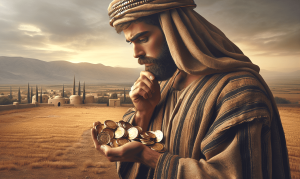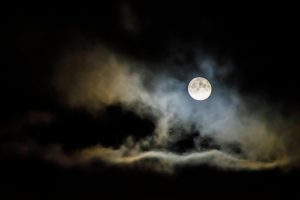We live in a world increasingly fractured by political divisions and social tensions. Nearly everyone seems to get caught up in the storm of controversy and heated debates. But what if there was a different way? A path that leads not to further division, but to unity and peace?
This path begins with a simple yet profound truth: we are all recipients of undeserved kindness. The Bible reminds us in Titus 3 that “when the kindness and love of God our Savior appeared, he saved us, not because of righteous things we had done, but because of his mercy.”
This statement serves as a powerful equalizer. It strips away our pretenses of superiority and self-righteousness, reminding us that we all stand on level ground before God. None of us can claim to have earned our salvation or to be inherently better than others. We are all beneficiaries of divine mercy.
This realization should fundamentally change how we view ourselves and others. Instead of looking down on those we disagree with or considering ourselves morally superior, we’re called to “show true humility toward all people” (Titus 3:2). This includes even those in positions of authority, as challenging as that may sometimes be.
The early Christians faced far more oppressive governments than most of us do today. Yet, they were instructed to “be subject to rulers and authorities, to be obedient, to be ready to do whatever is good” (Titus 3:1). This doesn’t mean blindly following unjust laws or supporting corrupt leaders, but it does mean maintaining a respectful attitude and seeking to be a positive influence rather than a divisive force.
In our current political climate, many Christians have fallenl into the trap of slandering those we disagree with or getting caught up in endless arguments. Social media often feels like a battleground of ideologies, with each side trying to “own” or “destroy” the other. But the Bible warns us to “avoid foolish controversies and genealogies and arguments and quarrels about the law, because these are unprofitable and useless” (Titus 3:9).
Instead of engaging in these fruitless debates, we’re called to focus on what truly matters: living out the transformative love and kindness we’ve received from God. This means devoting ourselves to doing good, being peaceable and considerate, and showing humility to everyone – even those we might consider our opponents.
This approach isn’t always easy. It requires us to constantly remind ourselves of our own past – that we too were once “foolish, disobedient, deceived and enslaved by all kinds of passions and pleasures” (Titus 3:3). It’s only by God’s grace that we’ve been rescued from that state, washed clean, and given new life through the Holy Spirit.
Remembering this truth helps us maintain perspective. When we’re tempted to look down on others or get angry at those who seem to be “on the wrong side,” we can pause and recall our own journey. We can ask ourselves: Am I valuing being right over being in relationship? Am I letting political affiliations or ideological differences prevent me from seeing the inherent worth in every person?
The challenge before us is to rise above the fray of partisan politics and cultural wars. We’re called to be different – to stand out not by how loudly we argue our points, but by how deeply we love and how humbly we serve. This doesn’t mean we never engage in important discussions or stand up for what’s right, but it does mean we do so from a place of humility and grace rather than self-righteousness and anger.
Practically, this might mean stepping back from social media debates that only serve to increase tension and division. It might mean choosing to pray for leaders we disagree with instead of slandering them online. It could involve looking for ways to build bridges with those who hold different views, seeking to understand their perspectives even if we don’t agree with them.
Most importantly, it means continually returning to the source of our hope and transformation – the “washing of rebirth and renewal by the Holy Spirit” (Titus 3:5). As we allow ourselves to be continually renewed by God’s Spirit, we’re better equipped to extend that same grace and kindness to others.
In the end, our goal isn’t to win arguments or prove ourselves right. Our calling is far greater: to be living examples of the radical love and mercy we’ve received. By focusing on this “trustworthy saying” – the incredible kindness of God that rescued us – we can maintain the right perspective and avoid getting pulled into useless controversies.
As heirs of God’s kingdom, we have access to a peace and joy that transcends political affiliations and cultural divisions. Let’s choose to live from that place of security, extending grace to all and being “ready to do whatever is good” (Titus 3:1).
The world is hungry for authentic love and unity. If we, as followers of Christ, will embrace this counter-cultural approach, it has the power to make a real difference. It’s not always easy, but it’s the path we’re called to walk – a path of humility, kindness, and transformative love that can change hearts and heal divisions, one interaction at a time.
—–
Here’s a 5-day Bible reading plan and devotional guide for your week:
Day 1: The Kindness of God
Reading: Titus 3:3-7
Devotional:
Today, we reflect on the transformative power of God’s kindness. In our reading, Paul reminds us of our former state – foolish, disobedient, and enslaved by our own passions. But then something miraculous happened: God’s kindness appeared. This wasn’t because of our own righteousness, but solely due to His mercy.
Consider how God’s kindness has changed your life. How has His mercy washed and renewed you? Take a moment to thank Him for His undeserved grace. As you go through your day, look for opportunities to extend this same kindness to others, remembering that you too were once lost but now found by God’s love.
—–
Day 2: Living in Humility
Reading: Philippians 2:3-8
Devotional:
Paul’s instruction to show “true humility toward all” is a challenging yet crucial aspect of Christian living. Our reading today from Philippians expands on this concept, showing us Christ’s ultimate example of humility.
Reflect on areas in your life where pride might be hindering your relationships or your witness. Are there people you struggle to show humility towards, perhaps due to political or ideological differences? Remember that Christ humbled Himself for all, even those who opposed Him. Pray for the strength to emulate Christ’s humility in your interactions today, seeing others through God’s eyes rather than through the lens of worldly divisions.
—–
Day 3: Avoiding Useless Controversies
Reading: 2 Timothy 2:23-26
Devotional:
In a world rife with arguments and controversies, Paul’s advice to avoid “foolish controversies” is more relevant than ever. Today’s reading from 2 Timothy provides further guidance on this matter.
Consider your recent interactions, especially on social media or in discussions about current events. Have you been drawn into unprofitable debates? Reflect on how these might be affecting your spiritual life and your ability to show Christ’s love to others. Today, practice the discipline of stepping back from controversies. Instead, focus on gently instructing others and speaking the truth in love, always with the goal of leading people to God’s kindness and mercy.
—–
Day 4: Heirs of Hope
Reading: Romans 8:14-17
Devotional:
Paul reminds us in Titus that we have become “heirs having the hope of eternal life.” Our reading from Romans expands on this beautiful truth, emphasizing our adoption as God’s children.
Meditate on what it means to be an heir of God. How does this identity change your perspective on life’s challenges and joys? Remember that this inheritance isn’t something you’ve earned, but a gift given freely through Christ. Let this truth fill you with hope and confidence today. As you interact with others, consider how you can share this hope, inviting them to also become heirs in God’s family.
—–
Day 5: Devoted to Good Works
Reading: Ephesians 2:8-10
Devotional:
Paul emphasizes the importance of being “careful to devote themselves to doing what is good.” Our reading from Ephesians beautifully balances this call to good works with the reminder that our salvation is by grace alone.
Reflect on how your faith is manifesting in good works. Are there areas where you can be more intentional about doing good? Remember, these works aren’t to earn God’s favor, but a response to the grace we’ve already received. Today, look for specific ways to do good in your community, workplace, or family. Let your actions be a testimony to the transformative power of God’s kindness and love in your life.

It’s The Little Things
The Kingdom of God: Ownership, Faithfulness, and the Little Things Have you ever felt like God was a harsh taskmaster, just waiting for you

Seeking Wisdom Is Underrated
The Pursuit of Wisdom: A Path to Lasting Success Quick decisions and instant gratification is our culture’s calling card. However, there’s a timeless truth

Staying Hallowed On Halloween
Staying Holy in a Dark World: Navigating Halloween as a Christian As October rolls around each year, many Christians find themselves wrestling with how

Are You A Pillar Or A Prop?
Embracing the Noble Task: A Call to Leadership and Purpose Titles, status, and personal gain are huge drivers of worldly culture. Unfortunately those same

Time To Dig Deep
Building on Solid Ground: The Call to Dig Deep in Faith When things feel all topsy-turvy, we yearn for something unshakeable: a foundation that

Older Brother Syndrome
The Prodigal Wasn’t The Only Son We’ve all heard the story of the prodigal son – the wayward child who squanders his inheritance, only




